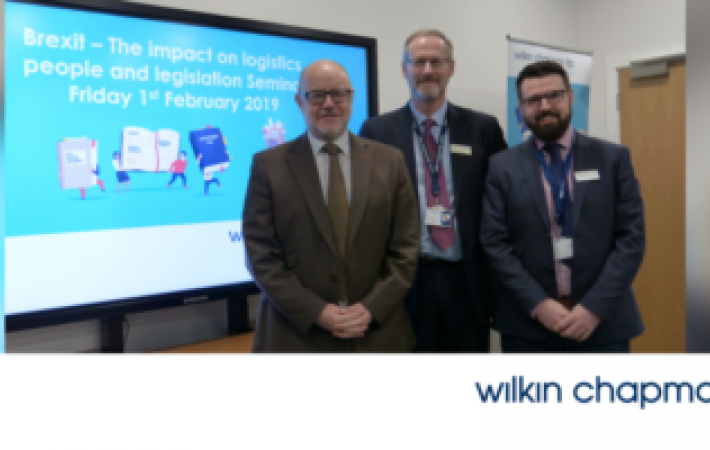01 February 2019
It’s time to talk to European suppliers and forge out new post-Brexit relationships, seminar hears.

Talking to European suppliers while acting now to retain valuable workers was advised at a Brexit seminar, which heard how the Humber is looking to a positive future outside the EU.
Held just three days after the latest Commons’ votes on the on-going controversy surrounding the country’s exit from Europe, Wilkin Chapman solicitors hosted the event at its headquarters in Cartergate, Grimsby.
Partner Russell Eke, who heads up the Corporate and Commercial team with joint responsibility for Business Services, welcomed the audience, saying: “Today we will try to assist you in making some sense of what is happening with Brexit, and will be drawing down our experience and expertise in certain sector areas in which to do so.”
Attended by a mix of businesses including seafood processing, logistics and offshore wind support and supply services, the seminar heard Wilkin Chapman Regulatory Partner Jonathan Goolden talk of how the Humber’s relationship with our ‘Nordic’ neighbours was vital. While not a part of the EU, Iceland is a member of the European Free Trade Association, which provides a platform for trading relationships with its EU neighbours.
“We may have a lot to learn from the Nordic countries over the next few years,” said Jonathan, who is Grimsby’s Icelandic Consul.
Giving an overview of the UK’s history with Europe, he added: “It doesn’t matter how you voted in 2016, or how you would vote now, it is about business and there are opportunities and challenges.”
Seminar speaker Simon Dwyer, the MD of Seafox Management Consultants, has been immersed in the logistics, transport and seafood sector all of his professional career and recalled the days before our entry into the EU when customs requirements and red-tape often led to a five-day lead time for goods from their European source to Humber delivery. There was a desire among everyone to avoid going back to those days and that was a major factor – along with the availability of labour for transport and processing, he said.
However, said Simon, there was optimism on the Humber that a ‘recalibration’ of the logistics trade would benefit the region. With a potential shortage of available labour, companies were likely to increase their use of non-manual transportation, which would see a migration of cargo into the Humber region, with the Southern ports losing out. Investment was already being made in anticipation of this, he explained.
Other issues outlined by Simon included the ease in which future business could be done with European suppliers and the demand on UK manufacturers should problems arise. He also highlighted EU-grant funding, cash flow, training and cost increases as things that should be considered.
“I would ask all our businesses to open into a dialogue with their European senders or receivers, what are they thinking,” he added.
Calum Hanrahan, an immigration solicitor with Wilkin Chapman spoke of the country’s current position on EU nationals working and living here, along with the plan post-Brexit, which will go ahead whatever the overall deal that is stuck.
Answering a question from the floor, he did highlight how the new arrangements detailed in the Government’s recent Immigration White Paper may well impact upon the current availability of short-term EU workers engaged in the Humber’s offshore renewables sector.
He encouraged employees to seek advice and clarity to assist them in ensuring they applied for the new non-settled and settled status requirements, that would be available to apply for from 30 March 2019. This would include workers from Iceland, Norway, Switzerland and Liechtenstein, as well as the EU.
“Free movement of EU nationals will end in 2021, whether there is a deal or a no deal, and thereafter EU citizens will be subject to similar or the same UK Immigration Rules as those from the rest of the world,” explained Calum.
He outlined how the points-based system based on skills, was not favourable to those lower-skilled workers on which the country had previously relied, which was envisaged as a problem with such workers already leaving.
For more information on any elements of immigration, Calum can be contacted via email at Calum.Hanrahan@wilkinchapman.co.uk